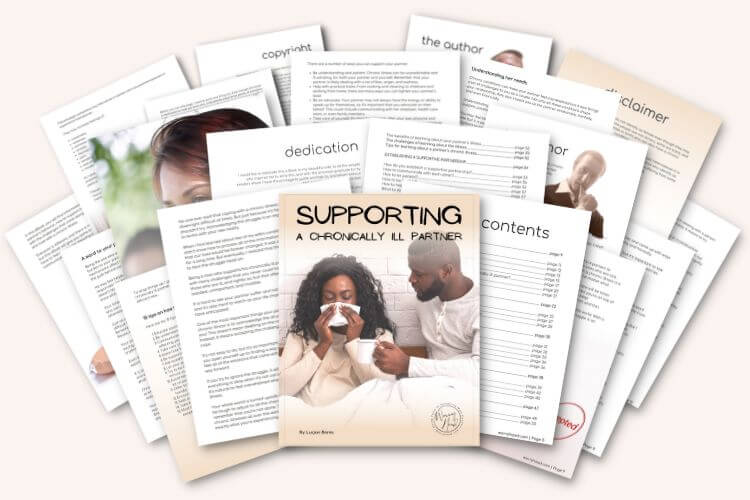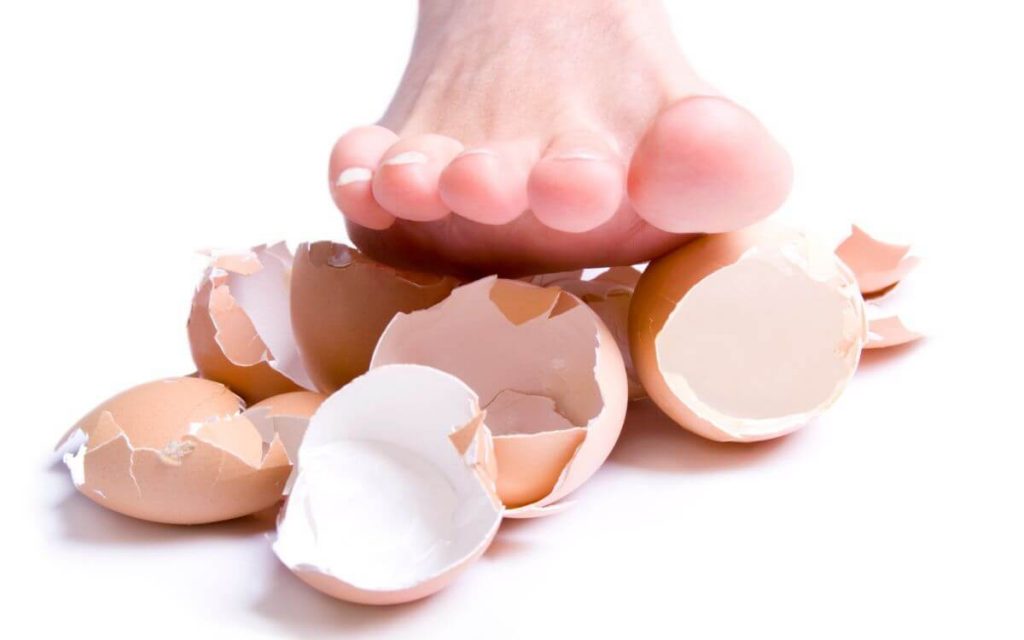How are men impacted by their partner’s illness?
There is so much support for chronically ill women, but nobody talks about their male partners, and how are men impacted by their partner’s illness.
Being one of the primary caregivers for a chronically ill partner can be very isolating and overwhelming. You are constantly worried about your partner’s health, while also trying to maintain some sense of normalcy in your own life. You may feel like you are walking on eggshells, and that any wrong move could make your partner’s condition worse.
This is especially true for men who care for their ill partners because it is socially accepted that women care about the sick and elderly, but when it comes to men, they are often seen as tough and emotionless. This means that men can often feel like they have to bottle up their feelings, which can lead to resentment and burnout.
I felt that on every level. I went through a lot of emotions I never experienced before my wife’s diagnosis of endometriosis and fibromyalgia. Supporting her through a decade of challenges made me realize how many men aren’t aware of how to support their ill partners.
Today, I want to help them understand what men like me go through when our partners, wives, or girlfriends have a chronic illness.
How are men impacted by their partner’s illness?
Men feel isolated, overwhelmed, and in constant worry over their ill partners. They have difficulty maintaining normalcy, and feel like they walk on eggshells in fear of making things worse. They aren’t understood by others which makes them feel resentment, guilt, and bottle up their emotions.
There are many reasons why men are impacted by their partner’s illness. I listed 13 of them below:
- feeling isolated
- feeling overwhelmed
- constant worry
- difficulty maintaining normalcy
- feeling like you’re walking on eggshells
- fear of making things worse
- feeling powerless
- resentment
- burnout
- bottled up emotions
- misunderstanding from others
- fatigue
- guilt
More on how are men impacted by their partner’s illness…
Men are impacted by their partner’s illness in many ways. In this article, we will explore how men are impacted emotionally, mentally, and physically by their partner’s illness.
Before we get right into it, one by one…
If you want to learn how to cope with your partner’s chronic illness, how to support her struggles, and manage a relationship with a chronic condition, I give away a FREE Chapter of my eBook: “Supporting a Chronically Ill Partner”.
This chapter alone has all the comprehensive information about acknowledging the struggles, including:
- A word to your partner.
- A word to you.
- Stepping on eggshells.
- Understanding her needs.
- How to acknowledge having a chronically ill partner?
- Acknowledging can be hard.
- 15 tips on how to do it!
Get the 1st Chapter FREE!
Chronic Illness for Partners

1. Feeling isolated.
Men feel isolated because they often don’t have anyone to talk to about their experiences. They may feel like they are the only ones going through this, which can be very isolating.
I often feel like my wife has to be prioritized, that she deserves all the help, but I don’t. I sacrifice a bit part of myself and feel like nobody else notices my sacrifice. It makes me feel very isolated at times, and I had to find ways to cope with this isolation.
2. Feeling overwhelmed.
Men feel overwhelmed because they are trying to juggle their own life with their partner’s illness. They may feel like they are constantly running around trying to keep everything together, and this can be very exhausting.
Maybe not very often, but sometimes I feel overwhelmed. The reason being is that I have a lot on my plate. I need to think about her needs, and wants, and maintain some sense of normalcy. It can be a lot, and I can get overwhelmed.
3. Constant worry.
Men feel constant worry because they are always wondering if their partner is going to be okay. They may feel like they need to be there for their partner 24/7, which can be very stressful.
It happened numerous times when I felt extremely worried about my wife’s well-being while I was at work. I knew that my wife’s anxiety or depression made her feel suicidal. She was going through suicidal thoughts, and I had to communicate with her over the phone to keep her safe.
This is something that many men in my position go through, but they barely speak about it.
4. Difficulty maintaining normalcy.
Men often have difficulty maintaining normalcy in their life because their partner’s illness can take up so much time and energy. This can lead to men feeling like they are missing out on aspects of their own life, which can be very frustrating.
This is one of the reasons why men are impacted by their partner’s illness. Maintaining normalcy is difficult when you have to take care of someone else. I often feel like I’m missing out on things because I’m always taking care of my wife.
5. Feel like you’re walking on eggshells.
Men often feel like they are walking on eggshells because they don’t want to say or do anything that might make their partner’s condition worse. This can be a very stressful way to live, and it can be hard to maintain over time.
This is something I feel pretty often. I feel like I’m stepping on eggshells around my wife whenever chronic illness impacts her mood. Endometriosis causes hormonal imbalances and makes her feel both, anxious and depressed.
Her other chronic disorder, fibromyalgia, also impacts her mental health. Her mood swings can be difficult to deal with, but I have no choice, I simply suck it up and take it on the cheek. Eventually, my wife always apologizes for her behavior knowing she can’t control it at the time.

6. Fear of making things worse.
Men often fear that they will make their partner’s condition worse if they do something wrong. This can lead to men feeling like they are not good enough, which can be very damaging to their self-esteem.
There are times when I feel blamed for things I haven’t done, or even wasn’t aware of. Whatever suggestion I make, I have to do it with caution because it might make things worse. It’s a lot of pressure, and sometimes I feel like I’m not good enough.
7. Feeling powerless.
Men often feel powerless because they are not in control of their partner’s illness. This can be very frustrating and make men feel like they are not able to help their partner in the way they want to.
I remember feeling this way when my wife was first diagnosed with endometriosis. I felt like I wasn’t able to do anything to help her, and it was very frustrating. I wanted to be able to do more, but I didn’t know how.
8. Resentment.
Men can feel resentment when they feel like their partner’s illness is taking over their life. They may feel like they are not able to live the life they want because of their partner’s illness, which can lead to a lot of tension in the relationship.
My reason for the feeling of resentful is similar to the one above. My wife doesn’t do it intentionally, but the anger she often experiences is directed at me because I am around at the time when she feels very stressed.
9. Burnout.
Men can experience burnout when they try to do too much for their partners. They may feel like they are not getting any help, which can lead to them feeling isolated, overwhelmed, and exhausted.
This is true for many men, luckily, I never experienced caregiver burnout. I have two reasons for that. One is my optimistic attitude towards her, the other is my love for blogging.
The latter not only helps me deal with my emotions but by sharing my experiences, I help other men in similar situations avoid the mistakes I have made. I gain, they gain, and on top of everything, I constantly research new information on my wife’s chronic conditions.
I’ve learned more about endometriosis and fibromyalgia from blogging than from any medical professional.
10. Bottled-up emotions.
Men often bottle up their emotions because they feel like they need to be strong for their partners. This can lead to men feeling like they are not allowed to express their own feelings, which can be very detrimental to their mental health.
I’m not guilty of that. I used to hide my emotions, and even though I don’t show them to my ill partner, I express them in writing on my blog.
11. Misunderstanding of others.
Men often feel misunderstood by others because people don’t expect men to be caregivers. They may feel like they are not doing enough, or that they are not supposed to be feeling the things they are feeling. This can be very confusing and frustrating for men.
I personally believe that society isn’t aware of how men are impacted by their partner’s illness. We were told to be tough and to take care of our women. This gives a faulty impression of men being emotionless, which isn’t the case.
Men are just as likely to be caregivers as women, and we need to start recognizing that. Men need to feel like they are allowed to express their feelings and that they are not alone in this experience.
12. Fatigue.
Men can experience fatigue when they are trying to balance their own life with their partner’s illness. They may feel like they are always tired, and this can lead to them feeling irritable and short-tempered.
Personally, I never felt fatigued, but I totally agree with the overwhelm that men often struggle with makes them feel fatigued. There is only so much a human being can take. Everyone has a breaking point, and that includes men too.
12. Guilt.
Men can feel guilt when they feel like they are not doing enough to help their partner. They may feel like they are letting their partner down, which can be very hard to deal with.
I felt guilt for many reasons, the most common being that I just wanted to take time off from my wife’s anger. I know though, that it is not her fault, even though that doesn’t erase the feeling of guilt. Sometimes I just need a break, I want to be elsewhere, do my thing, and not feel responsible for anyone else but me.
It’s called self-care. This makes me reassured that my feelings are validated. I need to take care of my own mental well-being.
Get the 1st Chapter FREE!
Chronic Illness for Partners

How can men feel less impacted by their partner’s illness?
There are a few things men can do to feel less impacted by their partner’s illness:
- Talk to someone who understands. It can be really helpful to talk to someone who understands what you are going through. This can help you feel less alone and can give you some valuable insight.
- Take some time for yourself. It is important to take some time for yourself, even if it is just a few minutes each day. This can help you recharge and can help you feel more capable of dealing with your partner’s illness.
- Find a support group. There are often support groups available for caregivers. This can be a great way to meet other men who are in similar situations, and it can help you feel less alone.
- Seek professional help. If you are struggling to cope with your partner’s illness, it may be helpful to seek professional help. This can provide you with valuable tools and insight that can help you deal with your partner’s illness in a more effective way.
I hope this article helped you understand how men are impacted by their partner’s illness. If you have any tips, questions, or suggestions, do not hesitate.
We can always meet in the comments section below and have a chat.


About Me
Hi, I’m Lucjan! The reason why I decided to create this blog was my beautiful wife, who experienced a lot of pain in life, but also the lack of information about endometriosis and fibromyalgia for men…
